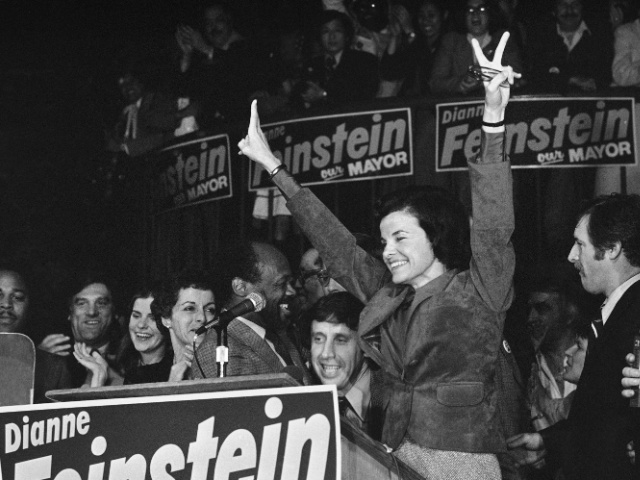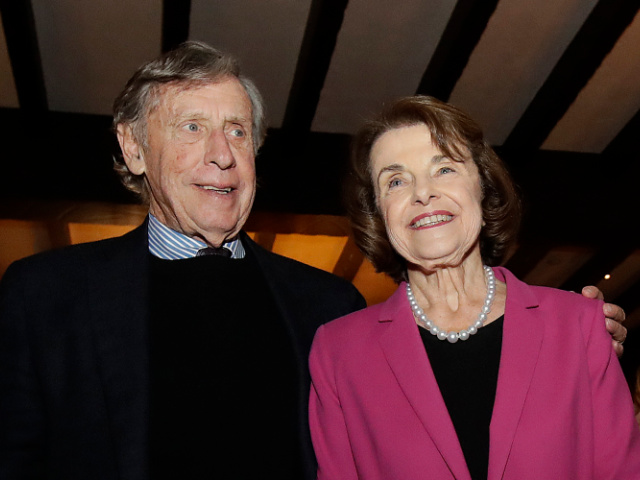The slow demise and death of Sen. Dianne Feinstein (D-CA) while still in office are the latest excuses for elites to restrict the choice of voters. Feinstein spent 30 years in the U.S. Senate and noticeably deteriorated physically and mentally over her final years. Friday, she succumbed at age 90, a small and shriveled shell of herself.
Gov. Gavin Newsom (D-CA) is expected to announce his replacement this coming week.
Born in 1933, Feinstein began her political career 53 years ago as a member of the San Francisco Board of Supervisors. She then served as that city’s mayor for ten years, from 1978 to 1988. After an unsuccessful run for governor, she was elected to the U.S. Senate in 1992. She served five terms and ran for reelection in 2018 at age 85. The uproar over this unexpected decision from some quarters did not move voters. She won the Democrat primary by eight points and faced no Republican opposition in the general election.

San Francisco Mayor Dianne Feinstein, named mayor following the assassination of Mayor George Moscone in San Francisco, Dec. 12, 1979, won the office in her own right, beating challenger Quentin Kopp by a large majority. With her on the victory platform are, from left, Moscone’s widow, Gina Moscone, Assemblyman Willie Brown, and Feinstein’s fiancé, Richard Blum (AP Photo/Sal Veder, File).
The perils of electing an 85-year-old to a six-year term quickly became apparent. Even before her body began its betrayal, her mind went. The death of her husband in 2022 seemed to accelerate the decline. It was a sad spectacle, but who was surprised? When you elect an 85-year-old to a six-year term, this is to be expected; this is what you are voting for.

In this Nov. 6, 2018, file photo, U.S. Sen. Dianne Feinstein, right, smiles next to husband Richard Blum at an election night event in San Francisco (AP Photo/Jeff Chiu, File).
My goal in recapping the above is to avoid being accused of sugarcoating the truth of what happened. What happened happened, and my reaction is still, So what? The people of California should be allowed to elect anyone they choose, even if it is an 85-year-old woman who is already deteriorating. This is a representative democracy. The Constitution already places certain restrictions on those who can hold certain offices. Those restrictions make sense to me. Arbitrary age restrictions and term limits make no sense and will almost certainly be abused to restrict who can and cannot serve in office — or on the Supreme Court.
If this country is dumb enough to reelect a feeble, frail, and failing Joe Biden, that’s our decision. We will make that decision, not some arbitrary, one-size-fits-all law.
Right now, former President Donald Trump is the same age as His Fraudulency Joe Biden was at this same time in the 2020 presidential election – and there’s no comparing the two. Trump is as energetic and lively as he ever was. Four years ago, Biden was afraid to leave his basement. Trump is still a thriving, virile man. Biden can’t draw a clock and shuffles like a caricature of an old man.

Former U.S. President and Republican presidential candidate Donald Trump gestures as he prepares to deliver remarks at a Nevada Republican volunteer recruiting event at Fervent: A Calvary Chapel on July 8, 2023 in Las Vegas, Nevada. Trump is the current frontrunner for the 2024 Republican presidential nomination amid a growing field of candidates. (Photo by Mario Tama/Getty Images)

US President Joe Biden is helped up after falling during the graduation ceremony at the United States Air Force Academy, just north of Colorado Springs in El Paso County, Colorado, on June 1, 2023 (BRENDAN SMIALOWSKI/AFP via Getty Images).
Knowing this, what should the age cutoff be? If we use Biden as a guide, the cutoff should be 76. But that would stop a Trump from running when there is no valid health or mental reason to stop a Donald Trump from running.
Term limits are another absurd idea. If the voters so choose, they can limit a term. That is up to them, and it should remain up to them.
Another argument on limits is what the Founders intended. The Founders could not foresee a time when people would live into their 70s and 80s. That may be true, but if we’re going to jump into the mind of the Founders, let’s start with what age 35 meant in the late 1700s compared to today. Nearly 250 years ago, the Founders said you must be at least 35 years old to run for president. Well, 250 years ago, the average life expectancy was 56.6 years old. If you were 35 back then, you were well into middle age. Out of respect for the Founders’ intent, should we increase the age limit for the presidency to 55 or 60?
Age limits and term limits all sound great in the abstract. They even make sense in the abstract. I get the attraction. Yes, there would be an upside to these limits, but that upside is not worth the downside of removing choices from We the People.

COMMENTS
Please let us know if you're having issues with commenting.